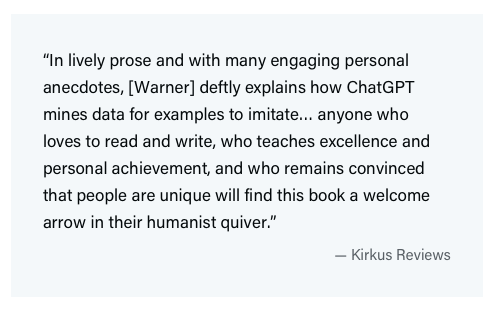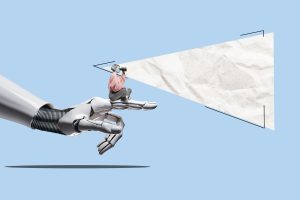Two big things, personally, happened this week, and I want to explain how while they may seem different on the surface, they’re sort of inextricable from each other.
One thing that happened was the release of my book More Than Words: How to Think About Writing in the Age of AI. Regular readers of this space will be well familiar with the subjects and themes of the book, but of course a book is a different thing than a blog or column.
I do my best to always make what I share here worth reading, but often the ideas I explore in this forum are in a much earlier stage of gestation. Writing is thinking, and while sufficient thinking has to occur for me to get a post onto the page, posting a column does not end the thinking.
A book is a chance to hone that thinking into an extended argument and experience, seeing those initial individual thoughts join together, and in this joining shift in important ways as I seek greater clarity and more impactful presentation. One of the reasons I don’t really understand people’s enthusiasm for turning their writing over to large language models is that the process of working through my own thoughts is 100 percent necessary to delivering the final product.
There is no shortcut if I want the book to be as good as possible.
Anyway, as I wrote at my personal newsletter in a post celebrating the book’s release, I’m proud of it. It’s good! Or the best I can do at this time, anyway, which is its own form of good. If you’re at all concerned about how tools powered by generative AI are encroaching on our spaces of working, learning and thinking, you might find some value in it.
Kirkus Reviews had this to say:

The other thing that happened this week is the launch of a new newsletter, Academic Freedom on the Line, that I’ll be helping oversee as part of my fellowship for the Center for the Defense of Academic Freedom (CDAF).
CDAF has been organized around a vision statement and a mission statement.
Vision Statement
We believe that teaching, learning, and the pursuit of knowledge are essential to creating and sustaining multi-racial and plurinational societies. For those of us working and studying within institutions of higher education, this means pursuing knowledge wherever it leads, free from intimidation and retaliation. Such freedoms serve as the foundation upon which we educate students, produce and disseminate credible research, nurture artistic expression and foster critical inquiry.
Mission Statement
The Center for the Defense of Academic Freedom is committed to preserving and expanding conditions that make it possible to work, teach, learn, create, and share knowledge in ways that promote the common good. The center serves as a resource and knowledge hub for all people—including faculty, students, campus workers, alumni, administrators, trustees, parents, journalists, policymakers, and business leaders—seeking to build a flourishing higher education system, rooted in institutional autonomy, workplace democracy, and freedom from coercion and external interference.
To work towards these goals we:
- create practical resources and build strategic partnerships for those engaged in defending academic freedom,
- produce original research that can serve as the evidentiary basis for this work, and
- communicate the value of academic freedom and institutional autonomy to wide audiences.
The first newsletter post is an annotated version of these statements, where some of the other fellows comment on different parts of each, and I encourage you to check it out for yourself to see how important individual perspectives are even inside of communication that is meant to reflect group consensus.
I also encourage you to sign up for the newsletter ,since we’ll be sharing more information and research all the time.
A couple of weekends ago, we had an in-person gathering of CDAF, along with some other folks concerned about the attacks on academic freedom (PEN, AAUP, et al. …), and I was struck by how important it is to have all these different perspectives when considering complex and important problems.
Even though it was a gathering of people with a broad base of shared values, there were many different perspectives, and I lost track of the number of times I experienced a moment of, I hadn’t thought of it that way.
Here’s how I see these two different strains of my work as intimately related. At the heart of More Than Words is my belief that humans have a right to their own minds, that part of exercising our freedom is being given the chance to interpret the world and then impress ourselves onto the world around us through communication rooted in our unique intelligences. Writing is a great way to achieve this, as I’ve experienced firsthand, not just because I have some public platforms for my writing, but because the act of writing allows me to know what I think and believe.
The boosters of the syntax-generating technology speak of it in liberatory terms, that the technology frees one up to not have to do difficult and maybe even unrewarding work. But in my view, giving over the work of writing to a probability machine is anti-freedom. The process matters.
The process of academic freedom matters, too, which is why we sometimes (often) have disputes about what academic freedom means or how it can be supported in institutions. As a baseline, we need people to believe that academic freedom matters, that it is more than an abstract idea and it is, in fact, a way to make possible the work we want our institutions to do. This is what is being threatened at this time.
One of the consistent themes of the weekend gathering was that deep down, we’re not just defending academic freedom, a term that we all acknowledge comes with some baggage, but we are trying to preserve important parts of our democracy.
I don’t want to overinflate the importance of this work, either my own with my writing about writing or the efforts of the fellows of CDAF. There are clearly more urgent threats at this moment.
But at the same time, I don’t want to shy away from the fact that there’s a lot at stake, and that what’s being threatened is our ability to self-govern.
It matters. It all matters.








